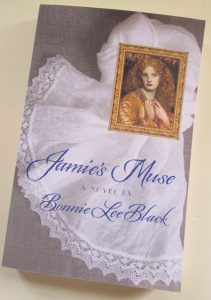In advance of my upcoming book tour for my “newborn” novel, Jamie’s Muse (see previous post, “Jamie’s Muse is Born”), I thought I’d try to anticipate a few questions I might get from audience members at my readings. Such as: “Who’s Jamie?” and “What do you mean by ‘Muse’?”
“Good questions!” I’ll respond, and then I’ll try to explain, before sharing an excerpt from the book that should illustrate my answers.

Jamie was the childhood name of the real, historical person, Scottish author and playwright James Matthew Barrie, best known as the creator of Peter Pan. Prior to that play’s first production in 1904, when Barrie was forty-four, though, he had been diligently striving to succeed as a writer in London for more than two decades.
As it happened, my Scottish great-grandparents, Helen Reid David and William Black, were childhood friends, contemporaries, and neighbors of Jamie Barrie in their hometown of Kirriemuir in Angus, Scotland. And as I imagine it in this historical novel, Jamie and Helen, both misfits in their little town, were particularly close friends and confidants.
It was he who suggested that she and Will, in their early twenties and newly married, emigrate to South Africa when she’d complained to Jamie how much she hated working — like a piece of machinery — in the town’s linen factory.
“The world is wide,” Jamie tells Helen on one of their long walks together into the undulating valley. “Have you thought about the colonies? …”
Spirited young woman I imagined her to be, she took Jamie up on his suggestion, talked her adoring Will into emigrating, and off they went to start their married lives in Zululand. The year was 1882. Within a few years they were dead.
Jamie Barrie, being a sensitive young man who’d loved Helen like a sister, was more than distraught by the news of her death. He was wracked by guilt and remorse. He felt responsible for her death. He became haunted by her. Her spirit drove him. She became his muse.
This excerpt from Jamie’s Muse is from the chapter titled “London 1889,” pages 139-141:
He [Jamie] dealt with the death of his childhood friend Helen by burying himself alive. He worked himself to exhaustion on articles, book reviews, theater reviews, stories, novels and plays. Early on, he had promised his mother back in Kirriemuir that he would “make her proud” in his pursuit of a literary career in London. But now he had Helen in mind as well. He wanted Helen, wherever her spirit had gone, to look on him with even more approval and pride than she had had when she was alive on earth.
In fact, he developed the habit of imagining that Helen was actually sitting across from him at his writing table in his London lodgings while he read aloud, as he had always read aloud to his mother in Kirriemuir, whatever he had just written. His imagination, ever-overactive, now provided him with solace. He pictured Helen intently listening to his every word, to the very end.
Did you like it? he’d quiz her. Did it ring true? Was there enough detail? Too few descriptions? “My mother doesn’t care for scenery—that’s why there is so little of it in my writing,” he explained aloud to Helen’s spirit. He found that imagining Helen’s presence not only became the antidote to his guilt and sorrow over her death, it also spurred him on in his literary climb.
He wrote authoritatively on a wide range of subjects, spending pleasant, quiet hours in London’s reference libraries, as well as at a favorite bookshop, Denny’s, on Holywell Street, a shabby, narrow alley that smelled to Jamie deliciously of old books. He filled his pocketsize notebooks with ideas and never wasted any of them. As soon as he finished writing one item, he’d begin work on another. Often, he’d work on several concurrently.
His writing, his sole passion, possessed him. He worked as if driven by a ghost—Was it Helen’s, he wondered?—puffing on his pipe, pacing up and down his room, then returning to his writing table again to cover page after page with his small, almost illegible script.
When he’d first arrived in London, Jamie had set three goals for himself: to earn a pound a day, to reach some little niche in literature, and to become a favorite of the ladies. With his tireless industry and seemingly limitless talent, he succeeded at reaching his first two goals, beyond his imaginings, within only a few years.
But as a sorely shy man of only five feet tall, with stooped shoulders, deep-set eyes and forgettable looks, he found his third goal ever beyond his reach. He felt, he’d confided in a letter to Helen the year before, “a profound dejection about his want of allure.”
Only Helen, among the women in his life who were not family, had accepted him for who and what he was, he felt. Only she had appreciated his idiosyncrasies and admired his creative talents. Once, he recalled, she’d even called him a genius.
Upon her death, then, Helen achieved a kind of sainthood in Jamie’s mind. He placed her on a lofty pedestal, near those of his mother and sisters, against which no other woman could humanly measure up. In his dramatic imagination, Helen, his first leading lady, the star of all his childhood theatrical productions, became his ideal.
~ ~ ~
[For more, please order Jamie’s Muse from www.amazon.com or direct from the publisher at www.nighthawkpress.com.]
